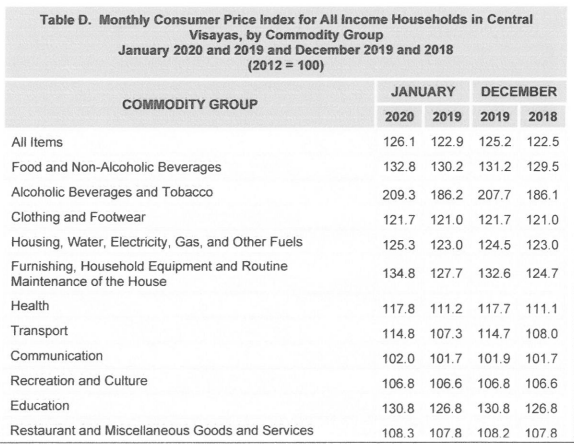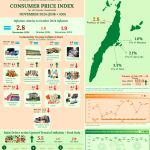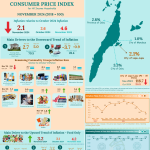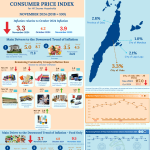Starting March 2018, the Philippine Statistics Authority (PSA) released the rebased CPI series as announced in the press release number 2018-031 dated 22 February 2018. The CPI series for July 2018 onwards shall be 2012-based.
Year on Year Inflation rate in Central Visayas was recorded at 2.6 percent
The year 2020 started off with a higher regional inflation rate of 2.6 percent. This is the highest inflation recorded since March 2019, in which the inflation was posted at 2.2 percent. Inflation in December 2019 was also recorded at 2.2 percent, and in January 2019, 4.4 percent (Table A).

The uptrend of the inflation in January 2020 was mainly driven by higher annual rate posted in the heavily-weighted food and non-alcoholic beverages index which registered an annual increment of 2.0 percent. In addition, inflation in the following commodity groups were higher during the month:
Alcoholic Beverages and Tobacco, 12.4%
Housing, Water, Electricity, Gas, and Other Fuels, 1.9%
Transport, 7.0%;
Communication, 0.3%;
Restaurant and Miscellaneous Goods and Services, 0.5%
Constant inflation from the previous month were carry over by the following commodity groups:
Clothing and Footwear, 0.6%;
Health, 5.9%;
Recreation and Culture, 0.2%;
Education, 3.2%;
Meanwhile, inflation of Furnishing, Household Equipment and Routine Maintenance of the House was lower at 5.6 percent for the month.
January 2020 CPI in Central Visayas was recorded 126.1
The CPI in Central Visayas was recorded at 126.1 in January 2020. An incline was noted from previous month which was at 125.2. A decline of the CPI was observed in the months of February, March and October 2019. There was an increasing movement of the CPI from January 2019 to January 2020.
Higher annual rate was noted in the indices of each commodity group from January 2020 and December 2019 compared to January 2019 and December 2018 (Table D).

Purchasing Power of Peso (PPP) was recorded at 0.79 in January 2020
Central Visayas recorded the lowest purchasing power of peso at 0.79 for January 2020. From January 2019 to January 2020, an increase in the PPP was recorded in the month of March 2019 at 0.82. There was a decreasing movement of the PPP from 0.81 in January 2019 to 0.79 in January 2020.
TECHNICAL NOTES
The Philippine Statistics Authority generates and announces the monthly Consumer Price Index (CPI) based on a nationwide survey of prices for a given basket of goods and services. Two important indicators, the inflation rate and purchasing power of the peso (PPP), are derived from the CPI which are important in monitoring price stability and the value of the country’s currency.
The CPI is an indicator of the change in the average retail prices of a fixed basket of goods and services commonly purchased by households relative to a base year.
Retail Price is the price at which a commodity is sold for spot in small quantities for consumption.
Base Period/Base Year is the period, usually a year, at which the index number is set to 100. It is the reference point of the index number series.
Market Basket is a term used to refer to a sample of goods and services that are commonly purchased and bought by an average Filipino household.
Weight is a value attached to a commodity or ground of commodities to indicate the relative importance of that commodity or group of commodities in the market basket.
Inflation Rate is equivalent to a decline in the purchasing power of the peso. It is the change in the CPI over a specific period of time (usually a month or a year). That is, where:
CPI1 - is the CPI in the previous period
CPI2 - is the CPI in the current period
The Purchasing Power of the Peso (PPP) is a measure of the real value of the peso in a given period relative to a chosen reference period. It is computed by getting the reciprocal of the CPI and multiplying the result by 100. That is,
Headline Inflation is the rate of change in the weighted average prices of all goods and services in the CPI basket.
Approved by:
(SDG.) ARIEL E. FLORENDO
Regional Director




